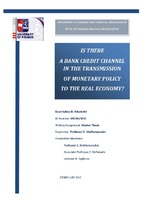Is there a bank credit channel in the transmission of monetary policy to the real economy?

Master Thesis
Συγγραφέας
Εξαρχάκου, Αικατερίνη
Ημερομηνία
2012-07-24Επιβλέπων
Μαλλιαρόπουλος, ΔημήτριοςΠροβολή/
Θεματική επικεφαλίδα
Τραπεζικά δάνεια ; Τράπεζες και τραπεζικές εργασίες -- Χρηματοοικονομική ανάλυση ; Bank loans ; Banks and banking ; Monetary policyΠερίληψη
The bank credit channel assigns banks a pivotal role in the transmission of monetary policy, which stems from imperfect information and other frictions prevailing in financial markets. Banks are deemed special in the extension of credit to borrowers that cannot access other types of credit, owing to their expertise in attenuating financial frictions. If banks adjust their loan supply following a change in the stance of monetary policy, this poses implications on real activity, since some borrowers are forced to cut back on their expenditure and investment decisions. This paper offers a comprehensive review of the existing literature and empirical research on the existence of a bank lending channel across the US and the euro area, as well as its relevant macroeconomic significance. The empirical results though have not yet reached a consensus. Moreover, it offers an insight into the reformulation of the traditional mechanism in light of financial innovation and the new operational framework of the banking sector. The reformulated bank lending channel operates primarily through the impact of monetary policy on banks' external finance premium as determined by their perceived balance sheet strength, in terms of leverage, asset quality and risk attitude, which is likely to have altered its fundamentals, as initially conceived.


